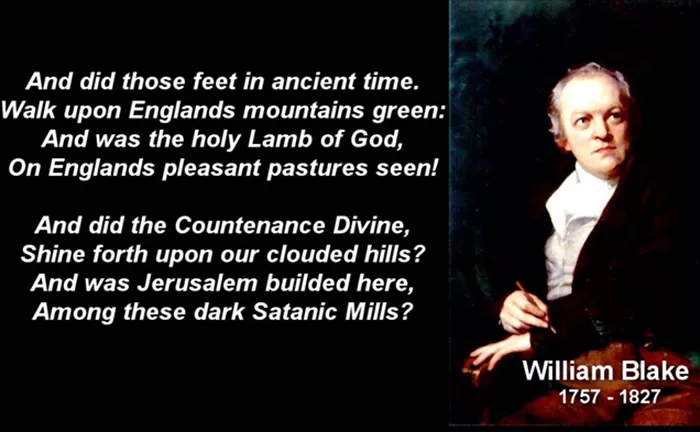Welcome to Poem of the Day – Milton: And did those Feet by William Blake
William Blake, a renowned poet, artist, and visionary, wrote the poem And did those feet as part of his larger work Milton: A Poem (1804–1810). Though the work is often viewed as a complex and spiritual journey, this particular poem has earned its place in English literature as a patriotic and deeply symbolic piece. Written in 1808, And did those feet has gained popularity, particularly in the form of the hymn Jerusalem, as it calls for the creation of a spiritual and utopian society on Earth.
Milton: And did those Feet Explanation
Summary of the Poem
The poem begins with a question: “And did those feet in ancient time / Walk upon England’s mountains green?” This line refers to the idea that Jesus Christ visited England during his lifetime, an assertion tied to myth and mysticism in Blake’s era. The speaker imagines Christ’s presence in England and asks whether his feet trod the land, leaving behind a divine mark upon it. This invocation of Christ represents the coming of a new spiritual age, one that aligns with Blake’s beliefs in a better, purer world.
The speaker continues by contrasting this image of Christ’s walking with the “dark satanic mills,” which symbolize the industrial revolution in England, associated with destruction and the loss of spiritual values. Blake laments the materialism and mechanical dehumanization of society, especially during the rapid industrial growth in the 18th and 19th centuries.
Themes and Meaning
Spiritual and Social Utopian Vision: The core of And did those feet is Blake’s call for a new Jerusalem—a utopia based on Christian spirituality and righteousness. Blake suggests that Christ’s spirit and message should be the foundation of a future world, a “Jerusalem” where peace, justice, and spiritual fulfillment reign. This vision reflects Blake’s longing for an ideal society that transcends materialism.
Industrialization and Alienation: Blake was deeply critical of the industrial revolution and its consequences on human life. The “dark satanic mills” represent the factories and the negative effects of industrialization—workplaces that alienated individuals from their true, creative selves. By invoking these mills, Blake critiques a society that prioritizes progress at the cost of spiritual and human values.
National Pride and Hope: Though the poem has a global, spiritual message, it also carries a sense of national pride. The reference to England and the vision of a renewed England is a call to reclaim the country’s spiritual roots. It reflects Blake’s patriotism, but not in the conventional sense. Instead, Blake seeks to restore England’s spiritual heritage, free from the corrupting influence of industrialization and materialism.
The Role of Christ: In Blake’s vision, Christ is the ultimate symbol of purity and truth. The poet asks whether Christ’s feet walked upon England’s land, hinting at the possibility of a divine, redemptive force coming to inspire the country. For Blake, Christ was not merely a religious figure but also a symbol of revolution against corruption and the degradation of society.
Conclusion
And did those feet by William Blake is a powerful and evocative poem that blends mysticism, spirituality, and social critique. Through its call for a new Jerusalem, Blake questions the spiritual state of England and humanity, while critiquing the destructive effects of industrialization. The poem stands as a timeless plea for a return to moral and spiritual values, urging society to seek a higher purpose in the face of materialism. Whether read as a religious anthem or a call for social reform, And did those feet remains a significant and influential work in Blake’s legacy.

